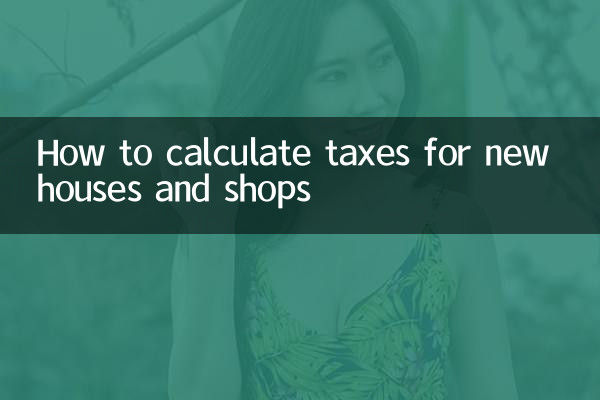How to calculate taxes for new houses and shops
In recent years, as the real estate market continues to heat up, buying new houses and shops has become the choice of many investors. However, many people do not know the specific calculation methods for the taxation of shop transactions. This article will provide a detailed analysis of the various taxes and fees involved in new house and shop transactions to help investors better plan their finances.
1. Main taxes involved in new house and shop transactions

When purchasing a new house or shop, the following taxes are mainly involved:
| tax type | tax rate | Tax calculation basis | taxpayer |
|---|---|---|---|
| Deed tax | 3%-5% | Shop transaction price | buyer |
| stamp duty | 0.05% | Shop transaction price | buyers and sellers |
| value added tax | 5% | Store value-added part | seller |
| personal income tax | 20% | Store value-added part | seller |
| land value added tax | 30%-60% | Store value-added part | seller |
2. Specific tax calculation method
The following is the specific calculation method of various taxes and fees in new house and shop transactions:
1. Deed tax
Deed tax is a tax that the buyer needs to pay, usually 3%-5% of the transaction price of the shop. For example, if you purchase a shop with a total price of 2 million yuan, the deed tax is:
| transaction price | Deed tax rate | Deed tax amount |
|---|---|---|
| 2 million yuan | 3% | 60,000 yuan |
2. Stamp duty
Stamp duty is paid jointly by the buyer and seller, and the tax rate is 0.05%. For example, for a shop worth 2 million yuan, the stamp duty is:
| transaction price | stamp duty rate | stamp duty amount |
|---|---|---|
| 2 million yuan | 0.05% | 1,000 yuan |
3. Value-added tax
Value-added tax is a tax that the seller needs to pay. The tax rate is 5%. The tax is calculated based on the value-added part of the store. For example, if the seller purchased a shop for 1.5 million yuan and now sells it for 2 million yuan, the value-added tax is:
| value-added part | VAT rate | VAT amount |
|---|---|---|
| 500,000 yuan | 5% | 25,000 yuan |
4. Personal income tax
The personal income tax rate is 20%, and the basis for tax calculation is also the value-added part of the store. For example:
| value-added part | personal income tax rate | Personal income tax amount |
|---|---|---|
| 500,000 yuan | 20% | 100,000 yuan |
5. Land value-added tax
The land value-added tax rate is relatively high, ranging from 30% to 60% depending on the value-added range. For example:
| Value added | Land value-added tax rate | Land value-added tax amount |
|---|---|---|
| 500,000 yuan | 30% | 150,000 yuan |
3. Tax exemption policy
According to relevant national policies, tax exemptions and exemptions can be enjoyed in some cases:
1. If the store is held for more than 5 years, value-added tax and personal income tax may be exempted.
2. In some areas, investors who purchase shops for the first time have certain discounts on the deed tax.
3. If the store is acquired through inheritance or gift, the tax calculation method will be different.
4. Summary
There are many taxes and fees involved in purchasing new houses and shops. Investors should fully understand the calculation methods of various taxes and fees before making a transaction and plan their funds reasonably. It is recommended to consult professional tax personnel or real estate agents to ensure that the transaction is legal and compliant and to avoid disputes over tax issues.
Through the introduction of this article, I believe everyone will have a clearer understanding of the tax issues for new houses and shops. In actual operation, be sure to carefully check various taxes and fees to ensure that the transaction proceeds smoothly.

check the details

check the details